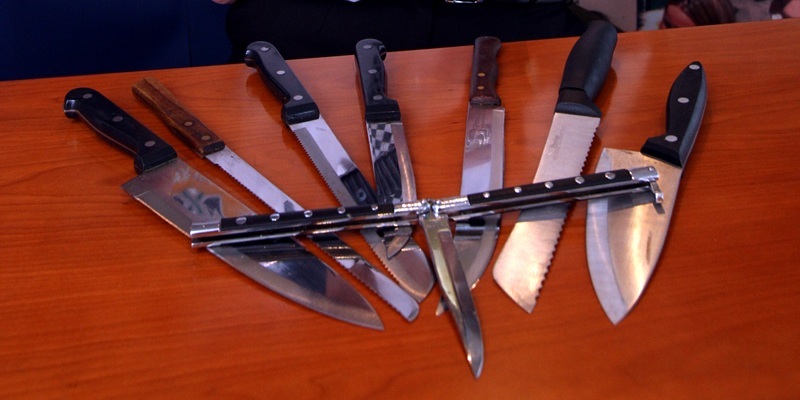The Scottish Government has been accused of failing to treat knife possession seriously after figures showed less than one-third of those convicted of carrying knives were jailed.
In Scotland last year 916 people received custodial sentences out of the 2855 convicted of carrying bladed weapons. In Angus only seven out of 32 (21.8%) people were jailed, while in Fife 34 people were sent to prison for carrying knives out of the 120 convicted (28.3%). In Dundee 33 of 88 (37.5%) were jailed and of 35 convicted in Perth and Kinross 17 were sent to prison (48.5%).
The figures were sought in a parliamentary question from Glasgow Rutherglen Labour MSP James Kelly. He said the figures for 2009-10 have to be considered alongside the number of high-profile knife murders and attempted murders since the start of the year.
“This all indicates that knife crime remains a big problem in Scotland,” he said. “We think the only way to deal with this is to give people the clear message that if they are caught carrying knives they will go to prison.”
A Scottish Government spokesman said the latest statistics show progress in the fight against knives, with falls across the country. “Crime in Scotland is at its lowest level in 32 years, homicide rates are at their lowest in 31 years, the number of people killed as a result of a knife is down 39% in the last year and the number of people caught carrying an offensive weapon is down to its lowest level in a decade down 30% since 06-07.”
It is a matter for individual sheriffs and judges to decide what sentence to impose based on the evidence before them, he added, but the courts already have the power to give jail sentences of up to four years to anyone caught carrying a knife.Maximum sentence”The justice secretary has also made clear that if a judge decides to impose the maximum sentence of four years based on the evidence before them, they will have his full support. Mandatory minimum sentences, as a one-size-fits-all approach to tackling knife crime, are not the answer and are not supported by leading police officers.
“As the recent official statistics show, what is working is a combination of tough enforcement on the streets backed by education through initiatives like the No Knives, Better Lives education campaign, which has seen knife carrying reduce by 35% during a pilot in Inverclyde.”
Strathclyde Chief Constable Stephen House said, “I cannot sign up to the idea that everybody who carries a knife should be locked up. We have to deal with the possession and use of knives sensitively and intelligently, rather than in a dramatic, headline-grabbing way that sounds like the obvious answer.”
In evidence to the justice committee, the Chief Constable of Lothian and Borders David Strang said, “Clearly each case is an individual. Each offender has a personal background and I think it’s absolutely proper that the court, having heard all the circumstances of the offence and of the offender’s circumstances, can impose a sentence that is appropriate.”
Detective Chief Superintendent John Carnochan of Scotland’s violence reduction unit said, “I’ve been a cop for 34 years. If I thought locking people up the first time they were carrying a knife and giving them four years in the jail would work I’d be your man.
“Jail doesn’t work we need early intervention, restricting access to alcohol and knives.”
The Liberal Democrats have highlighted another side of the debate, noting the cost of sending all knife-carrying criminals to prison would be more than £21 million a year if Labour’s mandatory six months in prison plan is implemented, as well as adding to the problem of overcrowded prisons in Scotland.
Previous Conservative calls for all convicted knife carriers to be jailed for two years would cost £83 million. The Lib Dems calculated that an extra 1345 people would be jailed and with it costing more than £31,000 to keep a prisoner for a year, costs would soar and prisons would bulge at the seams to the extent that another Barlinnie would need to be built to hold them all.
